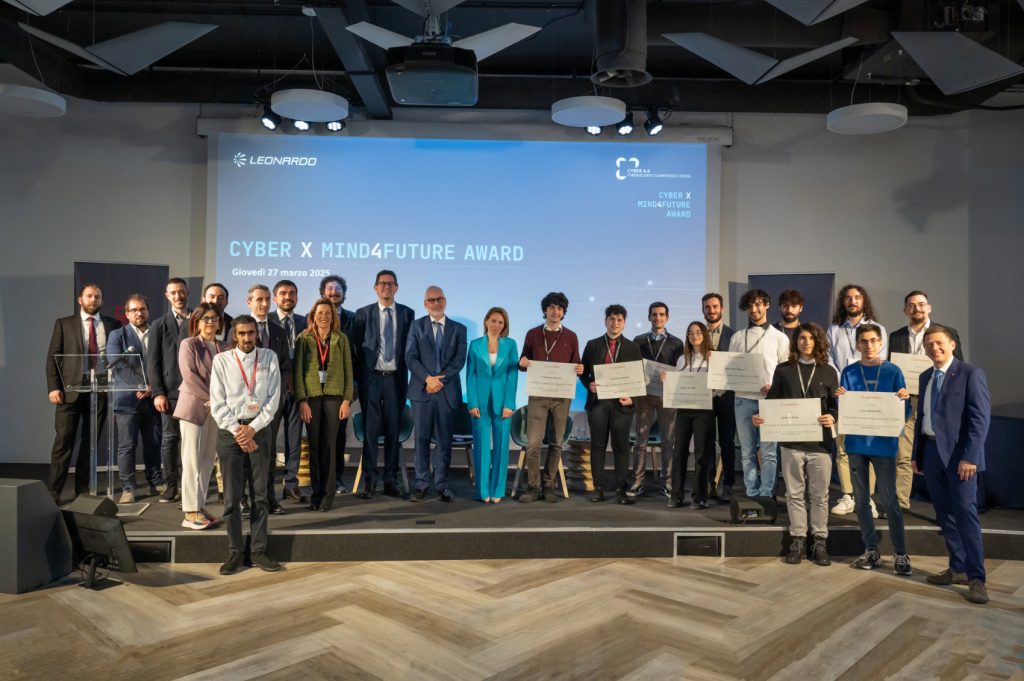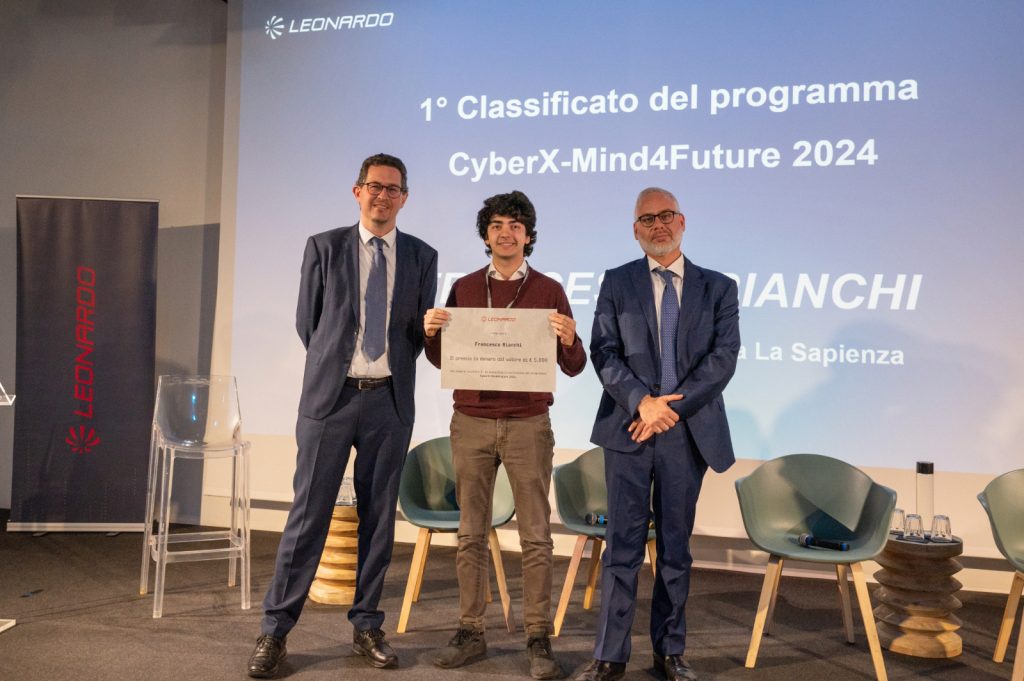
Rome, March 28, 2025 – An awards ceremony was held yesterday in Rome for the winners of Cyber X Mind4Future, the evolved and experiential training program on cybersecurity issues devised by CYBER 4.0, a national cybersecurity competence center sponsored by the Ministry of Business and Leonardo, among the world’s top companies in Aerospace, Defense and Security.
Awarded the 10 students who excelled in the training program, who were awarded a Leonardo-funded scholarship. Started in September 2024, the course has seen the participation of more than 450 students from the Center’s eight member universities (Sapienza, Tor Vergata, Roma Tre, LUISS Guido Carli, Campus Biomedico, Tuscia, Cassino and Lazio Meridionale, and L’Aquila). With a total of 15 hours of lectures, labs and four days of exercises on highly realistic simulated scenarios, the program alternated between classroom training and moments of true immersion in the cyber threat.
With Cyber X Mind4Future CYBER 4.0 and Leonardo are helping to respond to the growing needs of the market by offering young university students an opportunity to acquire new skills and experiment with frontier technology solutions in an area, cybersecurity, where demand for jobs far exceeds supply.
According to the ISC2 – ENISA ECSF Report, the cybersecurity skills gap has reached more than 4.7 million vacant positions globally by 2024. During the same period, there was a significant increase in hiring in the cybersecurity field, with the average age of employees falling to 40. In addition, entries into the industry by young professionals have grown, with many new hires also under 30. Professionals most in demand include experts in cloud computing security, security engineering, and risk assessment, analysis and management.
“We are extremely pleased with the results achieved with this initiative, which represents excellence in the cybersecurity experiential education landscape. Through an intensive course of theoretical training and practical challenges, students had the opportunity to confront complex security scenarios, developing skills critical to meeting the challenges of an ever-evolving industry – Leonardo Querzoni, president of the CYBER 4.0 Competence Center, said.. – The collaboration between our CYBER 4.0 competence center, Leonardo and the eight universities involved once again demonstrated the value of a synergistic approach between academia and industry. The success of this second edition confirms the importance of investing in advanced training to prepare the next generation of cybersecurity experts. Finally, I want to congratulate the ten award-winning students, who stood out for their commitment and ability, and thank all those who helped make this experience possible: the university professors, Leonardo technicians, and the CYBER 4.0 team. Initiatives like this are critical to strengthening the national cybersecurity ecosystem and
“Today, the domain of data represents the most effective snapshot to capture the changes in the society in which we live. The escalation of cyber threats has generated growth in the cybersecurity market, and it is crucial for institutions and companies to equip themselves with highly specialized resources in this area. However, the number of professionals with appropriate skills is still insufficient compared to market demand. We are in a phase of ‘skills shortage’ that requires a timely reaction, and initiatives such as Cyber X Mind4Future go exactly in this direction,” – underlines Antonio Liotti, Chief People & Organization Officer at Leonardo.
“We have done a lot of work as an agency on the Nis2 directive, the role of which is crucial, as it involves a revolution from Nis1. Nis2 was born in 2022, the year of Russia’s attack in Ukraine, and its generation expresses all the apprehension and concern that the cyber challenge will enter the tense confrontation we have in Europe. In NIS 2, 18 sectors become part of the European cybersecurity landscape; basic obligations will be adopted in April that affect all, both essential and important players. – says Bruno Frattasi, director general of ACN. – Fragmentation, facilitated by hackers and cybercrime activities, must be combated. In this regard, we are trying to pursue work to have a European cloud certification scheme. We have many good national patterns but not unique. One should be adopted.”
“In Europe and not only in Italy, we suffer from a lack of skills. According to some studies, one in two citizens has lower than basic digital skills. This figure is indicative of how far we still have to go. We need to prepare people so that they are prepared and competent on cyber risks. Cyber security is the real challenge for our future. We are immersed in the digital dimension, the Onlife, conjunction of the words online and life, in which the physical experience is intertwined with the virtual and digital experience, on which the continuity of our lives depends.”- Frattasi concludes.
Topics covered in the course included “cybersecurity skills & workforce gaps” in Europe and around the world, what are the most in-demand jobs in cyber, demand globally, the “European Cybersecurity Skills Framework” and the professions of the future, initiatives promoted by the Competence Center and success stories such as Cyber X, Let’s Cyber Game, Italian Game, Connected School and collaboration with ITS.

The 10 Leonardo-funded scholarships were awarded to:
- 5,000 euros for the first place winner, Francesco Bianchi (University of Rome La Sapienza)
- 3,000 euros for the runner-up, Luca Biazzetti (University of Rome La Sapienza)
- 2,500 euros for the third place winner, Massimo Palozzi (University of Rome La Sapienza)
- 2,000 euros for the fourth place winner, Andrea Fede (University of Rome La Sapienza)
- 1,500 euros for the fifth place winner, Lorenzo Ralli (University of Rome La Sapienza)
- 1,000 euros each for those ranked sixth to tenth: Francesco Rizzo (University of Rome La Sapienza), Giovanni Pimpinella (University of Rome La Sapienza), Filippo Bogetti (University of Rome La Sapienza), Lorenzo Ciafrelli (University of L’Aquila) and Chiara Iurato (University of Tor Vergata).
